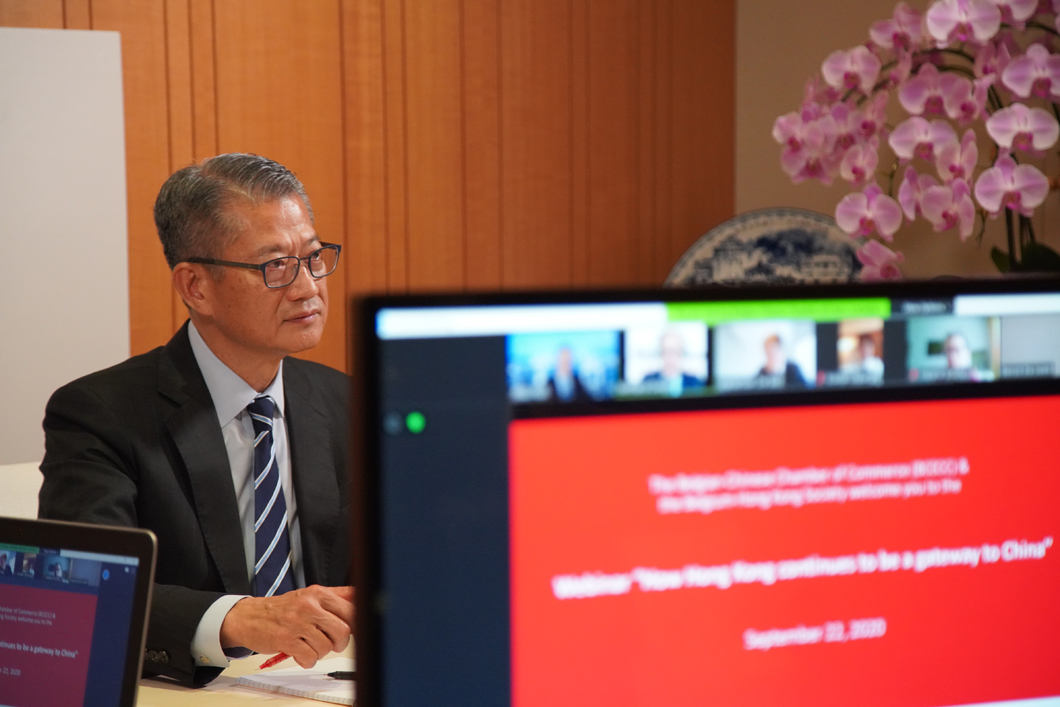Blog
Our unique role as a gateway
It has been more than half a year since the global outbreak of the COVID-19 pandemic and the situation remains volatile. In Hong Kong, the third wave of the outbreak has largely been brought under control and the number of new infection cases is gradually decreasing. On the other hand, the drastic resurgence of the epidemic in Europe is worrying, with new infection cases surging in some countries. The global economy is in a deep recession and the employment market is under huge stress. Given the latest development, any large-scale movement of people among countries is unlikely to be resumed before the end of the year, which would undermine economic recovery.

|
| Last week, I attended a webinar entitled "How Hong Kong continues to be a gateway to China" today to reaffirm to European entrepreneurs that Hong Kong continues to be the business bridge between the Mainland and the rest of the world. |
Last week, I attended the Asia-Pacific Economic Cooperation (APEC) Finance Ministers' Meeting 2020, which was convened virtually. Member economies not only shared their anti-epidemic strategies as well as measures to support economy and safeguard jobs, but also discussed how multilateral cooperation can be strengthened to promote post-pandemic economic recovery. I also joined a webinar last week to exchange views with some European entrepreneurs, who recognised Hong Kong's efforts in combating the pandemic. While paying attention to the impact of the escalating Sino-US tensions on Hong Kong's status as an international financial centre, the entrepreneurs expressed strong interests in our financial and asset management services and in using Hong Kong as a platform to invest in the Mainland market.
Some analyses point out that the global economic order is being reshaped by the pandemic and international geopolitics. Against this backdrop, some suggest that the intermediary role of Hong Kong would diminish gradually. However, I reckon that it is a process of finding a new equilibrium – be it in the international landscape or Hong Kong's positioning – amid the changing circumstances. With the changes in economic structure and market demand, services and products provided by Hong Kong should be adjusted accordingly. It is crucial for us to have a good grasp of the situation, consolidate our edges and adjust our positioning and strategy, so that we can maintain Hong Kong's key – even leading – position in the global supply chain, capital flow and technology race.
While the global economy is still in recession, the Mainland economy has returned to growth in the second quarter. Many economic activities, even tourism and consumption, have regained momentum. Many foreign enterprises' businesses in the Mainland have seen noticeable growth, which have incentivised these enterprises to further expand their market in the Mainland. While international geopolitical relations may remain tense at times in the near future, the reality is that countries have to cooperate to foster a speedy economic recovery. The Mainland has earlier announced the dual circulation economic model, with domestic demand (internal circulation) taking a primary role in driving economic development, supported by international commerce and trade (external circulation). The mutually reinforcing circulations will ensure continuous two-way exchanges between the Mainland and the global economy. Factors of production, such as talents, goods, capital and technology, and market dynamics will bring new opportunities for Hong Kong's development.
Over the past several decades, from the establishment of China to her continuous reform and opening up, the intermediary role of Hong Kong has indeed undergone constant changes, strengthening and upgrading. The key is to flexibly adjust our direction according to the changing international politics and market demand. Take the changes of the capital market in recent year as an example. Currently, foreign investors can invest in the Mainland capital market directly through the Qualified Foreign Institutional Investor (QFII) or the Renminbi Qualified Foreign Institutional Investor (RQFII) schemes. Still, nearly 70% of foreign investors' A-share trading is conducted through the Stock Connect arrangement between Hong Kong and the Mainland, namely the Shanghai-Hong Kong Stock Connect and the Shenzhen-Hong Kong Stock Connect. For the bond market, over 50% of foreign investors' trading of Chinese bonds in the Chinese Interbank Bond Market is carried out through Bond Connect, the turnover of which has already exceeded the overall turnover under QFII and RQFII.
In addition, MSCI, an international index company, has earlier announced the transfer of license of issuing index futures and options contracts based on a suite of indexes on Asia and Emerging Markets from the Singapore Exchange Ltd. to the Hong Kong Exchange & Clearing Ltd. This reflects Hong Kong's ability to draw investors from the international, regional and Mainland markets, connecting capital with projects, and investors with opportunities. Hong Kong is the best platform in the region to connect international talents, capital and enterprises.
The development path of Hong Kong has not been smooth. However, by overcoming enormous challenges and difficulties along the way, we have made Hong Kong the success we see today. We will overcome the pandemic someday. The imminent task for us right now is to make our best effort in fighting the pandemic, persevering the vitality of the economy, providing support to people hard-hit by the pandemic, and getting ready for future development.
September 27, 2020